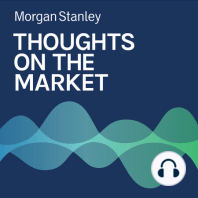4 min listen

What the U.S. Election Could Mean for NATO
What the U.S. Election Could Mean for NATO
ratings:
Length:
3 minutes
Released:
Feb 15, 2024
Format:
Podcast episode
Description
Michael Zezas, Global Head of Fixed Income and Thematic Research, gives his take on how the U.S. election may influence European policy on national security, with implications for the defense and cybersecurity sectors.----- Transcript -----Welcome to Thoughts on the Market. I'm Michael Zezas, Morgan Stanley's Global Head of Fixed Income and Thematic Research. Along with my colleagues bringing you a variety of perspectives, today I'll be talking about the impact of the US election on global security and markets. It's Thursday, February 15th at 3pm in New York.Last week I was in London, spending time with clients who – understandably – are starting to plan for the potential impacts of the US election. A common question was how much could change around current partnerships between the US and Europe on national security and trade ties, in the event that Republicans win the White House. The concern is fed by a raft of media attention to the statements of Republican candidate, Former President Trump, that are skeptical of some of the multinational institutions that the US is involved in – such as the North Atlantic Treaty Organization, or NATO. Investors are naturally concerned about whether a new Trump administration could meaningfully change the US-Europe relationship. In short, the answer is yes. But there’s some important context to keep in mind before jumping to major investment conclusions.For example, Congress passed a law last year requiring a two-thirds vote to affirm any exit from NATO, which we think is too high a hurdle to clear given the bipartisan consensus favoring NATO membership. So, a chaotic outcome for global security caused by the dissolution of NATO isn’t likely, in our view.That said, an outcome where Europe and other US allies increasingly feel as if they have to chart their own course on defense is plausible even if the US doesn’t leave NATO. A combination of President Trump’s rhetoric on NATO, a possible shift in the US’s approach to the Russia-Ukraine conflict, and the very real threat of levying tariffs could influence European policymakers to move in a more self-reliant direction. While it's not the chaotic shift that might have been caused by a dissolution of NATO, it still adds up over time to a more multipolar world. For investors, such an outcome could create more regular volatility across markets. But we could also see markets reflect this higher geopolitical uncertainty with outperformance of sectors most impacted by the need to spend on all types of security – that includes traditional suppliers of military equipment as well companies providing cyber security. Thanks for listening. Subscribe to Thoughts on the Market on Apple Podcasts, or wherever you listen, and leave us a review. We’d love to hear from you.
Released:
Feb 15, 2024
Format:
Podcast episode
Titles in the series (100)
Andrew Sheets: A Second (and Third) Opinion for Equity Markets by Thoughts on the Market